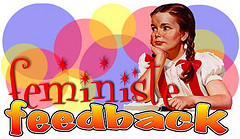
I’m going to make “Feministe Feedback” a regular feature here, given that the last two reader-response threads went really well (see: Raising Feminist Daughters and Talking to Your Partner About Sexism). I’ll try to do it weekly, although I think it’ll depend more on when questions for the peanut gallery are posed.
This week, the question comes from a regular reader and a close friend of mine in “real life.” The background is this: She and her husband (both 24) have taken in her husband’s 13-year-old cousin, who we’ll call A. They don’t have any other kids, and they only have A temporarily. Today, she emailed me with this (identifying information redacted or changed):
So. Today when I was home at lunch, A was saying how if his friend was gay, he’d punch him. I asked him why. Being gay is wrong, and being straight is right. I asked why again. No answer. So, I pulled up your video of Ellen, found the boy’s name, and googled the article. Then, I read it to A. I also told him about the 17 year that was killed (I sent you the article, I”m bad with names). Then I asked him if he thought it was okay that these guys got killed. He replied no. I asked why. He said they only needed to be beat up. To make a long story shorter, I continued asking questions, and discussing this with him. I was starting to get pretty upset. [My husband] jumped in a few times. A said it was okay for girls to be gay, but not boys. No answer for why that is. So I told him he had to think about why, and we were going to finish this discussion when I got home.
Jeez.
A is a smart kid. He’s pretty well versed in women’s rights. His mom was definitely a feminist. Wouldn’t even carry or use the word ‘purse’- only bags, lol.
I’m sure his parents have had gay friends, so this was pretty surprising to me. So we are going to keep talking and talking and talking about it.
Good thing is, is that I think having [my husband] hear this conversation made my point to him about how it all starts with a joke. And then snowballs into a 14 year old thinking its okay to kill someone.
I’ve never been stern with A cause I haven’t had to, so I think I kind of freaked him out because I was being really stern. If he was older, I would’ve been pissed, but I was trying to remain calm. He’s young, and really its not his fault. Hopefully I can get most of my point through to him. He’s a sensitive kid, so [my husband] asked him how he would feel if someone decided that being Mexican was wrong, and beat him up. (A is Mexican and Italian).
Having a 13 year old is hard.
Sure sounds like it.
So, Feministers: How do you talk to kids (your own or others’) about homophobia? How do you explain that homophobia is wrong to a 13-year-old who is steeped in it every single day, and who probably constantly hears “gay” as an insult from his peers? Any strategies for my friend and for other parents, guardians and folks who interact with kids?